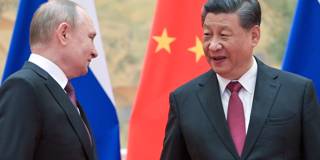OnPoint Subscriber Exclusive
The Big Picture brings together a range of PS commentaries to give readers a comprehensive understanding of topics in the news – and the deeper issues driving the news. The Big Question features concise contributor analysis and predictions on timely topics.

China’s Chance in Ukraine
Chinese President Xi Jinping is probably best placed to rein in Russian President Vladimir Putin and help bring peace to Ukraine. But that will require Xi to walk a diplomatic tightrope while also mitigating the collateral economic damage caused by the war and Western-led sanctions on Russia.
In this Big Picture, Yale University’s Stephen S. Roach notes that Russia’s invasion of Ukraine clearly violates principles that China has long held sacrosanct, and proposes three ways Chinese policymakers can take the lead in restoring peace and stability. And MIT’s Yasheng Huang argues that playing the role of mediator effectively will require China to retain its credibility as an honest broker and avoid explicitly condemning Russia’s actions.
Likewise, Nancy Qian of Northwestern University thinks that, while the additional war-induced spike in food and energy prices could be devastating for China, the country’s neutral political stance toward the conflict may also yield economic benefits. In that regard, Columbia University’s Shang-Jin Wei explains why China’s non-participation in the economic blockade of Russia will not make a huge difference to its overall effectiveness.
But others are less sanguine. Barry Eichengreen of the University of California, Berkeley, doubts whether the sweeping financial sanctions on Russia will prompt other countries to seek a safe haven for their foreign reserves in China – not least because Xi’s personalistic and largely unchecked regime resembles Putin’s. And Orville Schell of the Asia Society fears that the Russian and Chinese leaders’ shared Leninist narrative of victimization, which fuels both countries’ nationalism, will continue to reshape the post-Cold War global order.